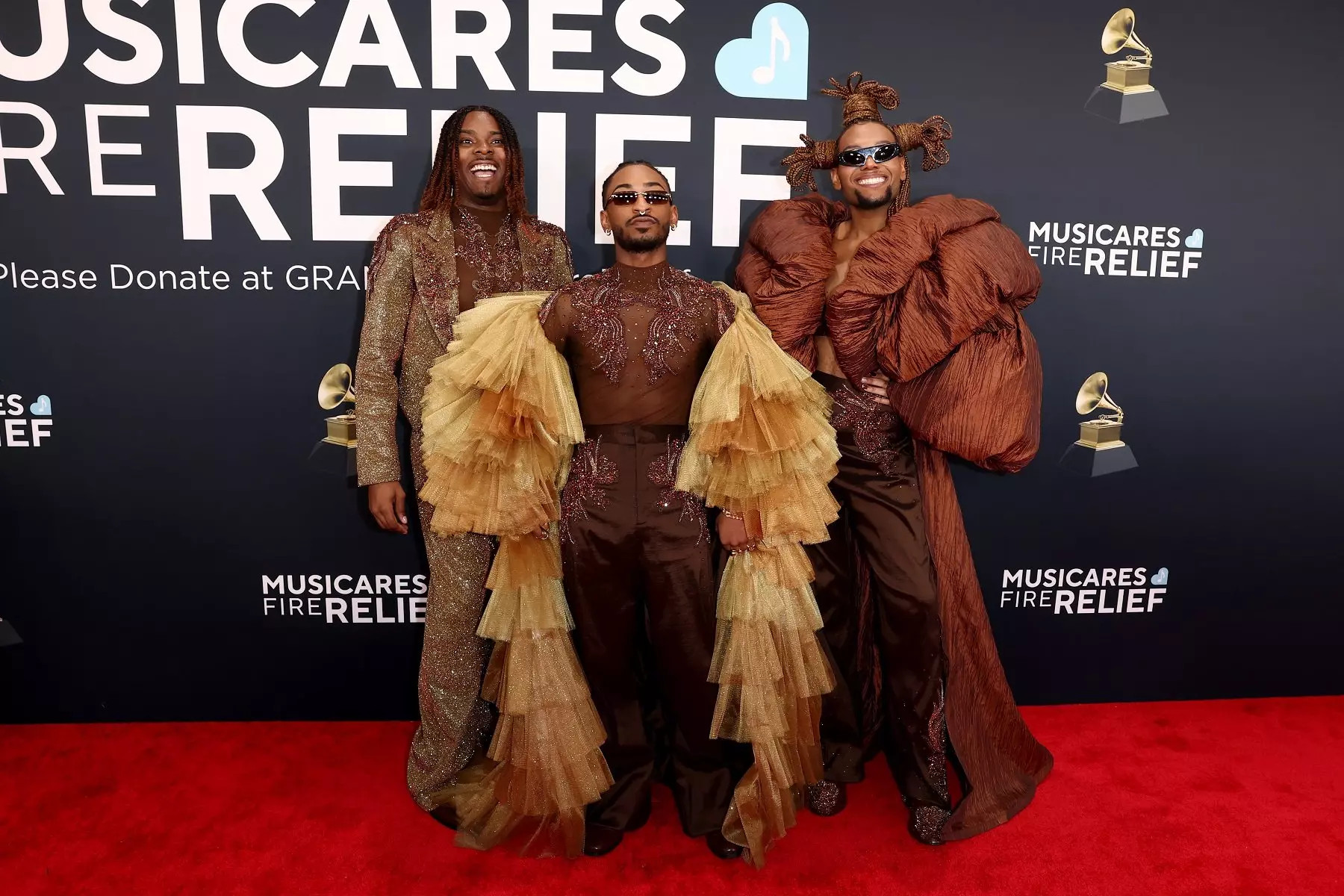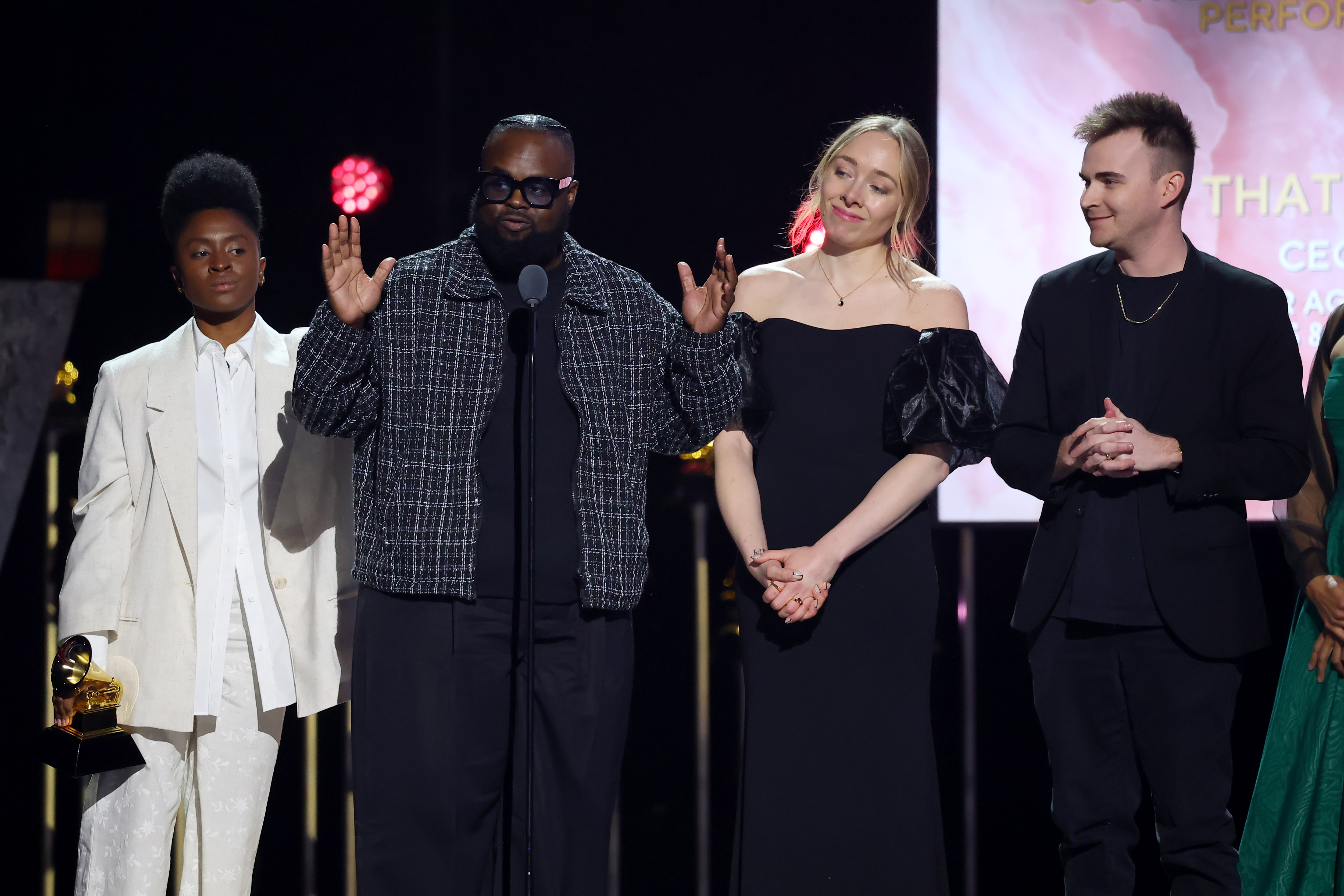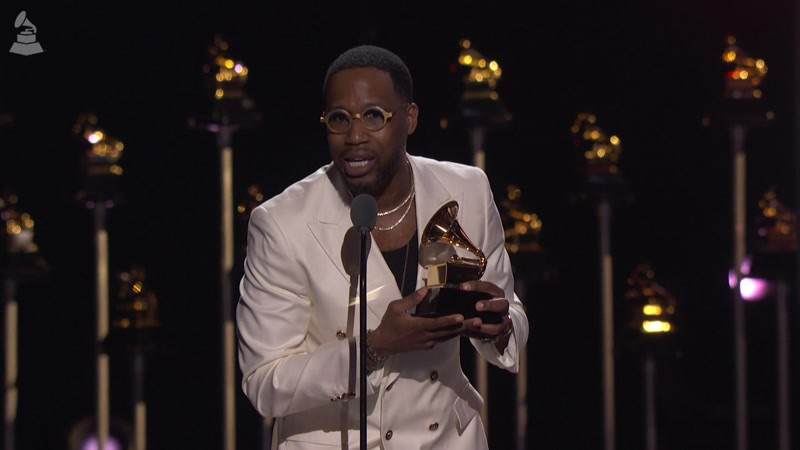The 2025 GRAMMYs telecast not only celebrated musical excellence but also served as a platform for raising crucial funds for those affected by the devastating wildfires in the Los Angeles area. Amidst this backdrop of community support, the nominations themselves highlighted stories of dedication, faith, and groundbreaking artistry, exemplified by The Harlem Gospel Travelers.
For Ifedayo Gatling, a GRAMMY nomination wasn’t just a dream; it was a declared intention. Fueled by prayer and unwavering belief, Gatling, along with Harlem Gospel Travelers bandmates George Marage and Dennis Bailey, felt a profound conviction after a particular studio session. “This song,” Gatling proclaimed, “will lead to a nomination at the 2025 GRAMMYs.” This powerful affirmation proved prophetic.
Indeed, divine favor seemed to answer their call. The vocal trio received a GRAMMY nod for their third album, Rhapsody, in the Best Roots Gospel Album category at the recent ceremony. This 10-track project, a vibrant tapestry of reimagined gospel classics from Numero Group’s esteemed Good God! A Gospel Funk Hymnal series, seamlessly blends the Harlem Gospel Travelers’ deep appreciation for the funk and soul sounds of the ’60s and ’70s with a fresh, contemporary gospel perspective.
“So many people have a certain view of what church is, a certain view of what gospel is. And sadly, it’s not always the positive side,” Gatling shared in an interview with GRAMMY.com. “I think that when people see us, they’re able to see a whole new side of what church, of what gospel is about and what the experience of being loved by God can be. And that is a greater calling than we could even say.”
While Rhapsody ultimately ceded the win to Cory Henry’s Church, the nomination itself was a landmark achievement. The Harlem Gospel Travelers etched their names in history as the first openly queer group, with Gatling being the first openly nonbinary artist, to be recognized in this category. While their queer identities weren’t concealed – their performances often hinted at a flamboyant aesthetic – Rhapsody marked the first album cycle where the members openly embraced their authentic selves.
Sharing this deeply personal aspect of their story was a courageous step, especially within a genre often perceived as traditional. “That leap of faith has led us to be GRAMMY nominees…but also to be beacons of light and representation for so many other people. To show them that they can have their dreams come true is beyond anything that we could have ever imagined,” Gatling elaborated. “Now queer people get to see us, young Black people get to see us, Christians get to see us. And that’s busting down doors and breaking glass ceilings.”
 The Harlem Gospel Travelers
The Harlem Gospel Travelers
Image alt text: The Harlem Gospel Travelers, GRAMMY nominees for Best Roots Gospel Album in 2025, pose for a group photo.
The Harlem Gospel Travelers’ origin story traces back to 2014 in their Harlem neighborhood. Musician, producer, and mentor Eli “Paperboy” Reed was conducting auditions for an after-school music program for teenagers when the harmonious voices of HGT, then including Asher Bethune, resonated from the choir. Collaborating with Reed, they released their debut album He’s On Time. Though the group initially disbanded as members went to college, the warm reception of their Colemine Records release prompted Reed to encourage a reunion. This led to Look Up!, an album showcasing original material.
Years later, enriched by further experiences and singles, HGT reconvened to interpret songs by gospel luminaries such as Chicago’s Pastor T.L. Barrett, Cleveland’s Shirley Ann Lee, and Brooklyn’s Jonah Thompson. Rhapsody, the resulting album, benefited from the rhythmic foundation laid by the Look Up! rhythm section and the seasoned touch of legendary gospel organist Gregory Kelly. The news of their nomination reached each member in distinct, everyday settings – Marage on the street, Bailey amidst a move, and Gatling at an airport in North Carolina – yet it resonated as a profound culmination of their shared purpose.
The Harlem Gospel Travelers engaged in a conversation with GRAMMY.com, delving into themes of divine intention, personal authenticity, and their mission to spread positivity to both believers and non-believers. Following their GRAMMY recognition, HGT was scheduled to join Reed on an Australian tour in May.
The following excerpts are from the GRAMMY.com interview, edited for clarity and conciseness.
What significance does a GRAMMY nomination hold for you both as artists and individuals of faith within your genre?
George Marage: From a young age, recognition for my voice, whether solo or as part of a group, has been a deep desire. This nomination feels surreal, especially sharing it with my two closest friends. At this stage, I hadn’t imagined this possibility, but God’s ways are often mysterious, and this feels like our moment.
Dennis Bailey: There’s an initial numbness when you hear “GRAMMY nominated.” Then, the excitement reignites, and it feels like that initial spark all over again.
Ifedayo Gatling: I keep saying to my mom, “I can’t believe it, yet I can believe it.” We’ve worked diligently and prayed fervently for this. George consistently affirmed, “We’re next, it’s going to happen.” Even in the studio, I felt it: “I’m going to the GRAMMYs next year. I don’t know who I’m going with, but I’m going.” After recording a particular track, I texted our producer, predicting, “We’re getting a GRAMMY nom for this.” It felt divinely ordained.
With this release, you shared more of your personal stories. To what extent were your identities already known in your previous work?
Gatling: The defining difference with Rhapsody is our conscious decision to openly share our queerness. This resonated deeply with our audience, allowing queer individuals to see themselves represented in a space where they might not have felt seen or accepted before.
Witnessing this impact, we realized we couldn’t limit ourselves or those who needed to see us. We chose to reintroduce ourselves, creating a space where anyone can find connection to God, gospel, or simply joy through our music and our authentic presentation. Whether you’re queer, not queer, believe in God, or not, you can connect with HGT.
Music born from deep faith and beautiful voices possesses a unique power to transcend boundaries. Can you elaborate on the creative journey behind Rhapsody?
Gatling: We each selected songs that would highlight different facets of our voices, personal musical preferences, or aspects of our personalities. As we collaborated, we inspired each other to explore new vocal and creative avenues.
For instance, with “Get Involved,” featuring Dennis, we intentionally incorporated a hip-hop sensibility. In live performances, this has evolved into a full-fledged rap.
We titled the album Rhapsody to reflect this sense of transformation – a sonic journey of transformation, but also a personal and life transformation.
The Good God! compilations are fantastic, and HGT’s affinity for soul-infused gospel is evident. What draws you to that particular era?
Bailey: The sheer exuberance of it all, the pervasive message of love, or at least the striving for it. The strong sense of community is what truly resonates with me.
Marage: In the ’60s and ’70s, there seemed to be a purity of expression. People conveyed their genuine feelings authentically. We consciously avoid excessive pitch correction or Autotune. What you hear on our recordings is largely what you experience live. Bringing that raw, real quality into contemporary music is something not many artists are doing.
Gatling: We are drawn to the music of that era because artists had to truly sing and play with conviction. It demanded complete commitment, leaving no room for anything less. This artistic integrity, which we grew up admiring, continues to inspire us in this era.
Did you grow up listening to this era of gospel music? Your bio mentions secular influences like Juvenile shaping your youth.
Gatling: My parents, in their late 50s and mid-60s, exposed me to their music and everything my grandparents listened to. This eclectic mix has profoundly shaped our musical direction.
Coming from a Baptist church, I was immersed in that gospel tradition. George’s background is in the Catholic church.
Marage: Gospel music wasn’t part of my early musical landscape. I was more inclined towards secular genres like R&B, Michael Jackson, Mariah Carey. It was meeting Ifedayo in a gospel program that introduced me to gospel music and the quartet style. I wanted to broaden my musical horizons to include gospel.
Bailey: I wasn’t raised in the church but was always around it. I spent considerable time absorbing the music and style. Later, I recognized the depth of the music. I also enjoyed secular artists like John Legend and Mariah Carey. In college, I embarked on a spiritual journey of self-discovery and reconnection with faith. It felt like fate that it led me back to gospel.
Is there a song on Rhapsody that holds particular significance for you?
Marage: “God’s Love” is a constant favorite. Singing in falsetto, I initially questioned my ability to reach the high notes of the original singer. It pushed me to reimagine and elevate an already incredible song.
Bailey: “Get Involved” encouraged me to embrace my relaxed personality. It perfectly embodies my laid-back vibe.
Gatling: “Searching for the Truth” was the song that sparked my Grammy prediction – and I was right! God is indeed good. But “God’s Been Good to Me” is the song I’m most proud of. I aimed for the spirit of artists like Aretha Franklin and Patti LaBelle, singers who perform with boundless energy. During recording, I reached an E-flat and felt that same power. “Amen.”
“Have You Tried Jesus,” is another standout. It possesses an undeniable anointing. Regardless of belief, the song compels you to raise your hands.
And “God’s Love,” again, showcases our unity. Listen to the harmonies – we are one voice, one band, one sound.
Despite a notable history of queer and trans gospel artists and contemporary Christian musicians who are queer, your church communities might not have always been welcoming to your authentic selves.
Gatling: I was born and raised in the church. The church embraces queer individuals more than it often vocalizes. Many of us are present within the church. While understanding may take time, church, at its core, is a beautiful space of love and worship when you find your community.
Finding your church home is essential. HGT serves as a form of church home, bringing the essence of church, gospel, and that energy to diverse spaces – clubs, festivals, anywhere we connect. You experience it and carry that love, building your own church family wherever you are, for worship, love, and whatever you seek. You are the church.
Is consciously bringing gospel to wider audiences, including those outside of faith, a part of your mission?
Gatling: It wasn’t initially intentional, but it unfolded organically, and we embraced the calling. None of us initially envisioned making gospel music professionally. It presented itself, and we accepted the responsibility. God consistently affirms this path.
We recognize that our audiences aren’t solely churchgoers. And that’s perfectly fine. We appreciate that you can offer praise even with a tequila in hand! I am inherently “churchy,” regardless of setting. Our bio reflects this balance: “On the way to church, we going to say give God the praise. On the way back from church, it’s ‘Back That Azz Up,'” representing the totality of life.
I believe people perceive a new dimension of church and gospel through us – an understanding of God’s love. This calling transcends our personal mission; it’s divinely guided.
George or Dennis, do you have thoughts on gospel music’s appeal to those outside the traditional faith space?
Bailey: We showcase a dichotomy of humanity often overlooked in gospel music. We are human. We enjoy life, including going to a club, but we are also deeply devoted to God. Showing that I can be both a regular person and someone deeply in love with my faith is humbling and beautiful.
Marage: We aren’t promoting queerness; we are expressing our authentic selves, being truthful, and being God-loving individuals. We strive to live righteously. Gospel signifies “good news,” and that’s what we aim to share – good news, positive energy, and good vibes. I believe we are on the right path.
Reports suggest some resistance from the traditional gospel industry due to your open identities and somewhat traditional sound. Is this accurate?
Gatling: Mainstream gospel music often adheres to a specific niche and aesthetic. We exist in a gray area because we don’t strictly identify as “gospel artists.” We create gospel music because it inspires and resonates with us, but we could easily create a pop record and still infuse it with our faith.
It’s less about being shunned and more about the world’s evolving readiness to embrace new forms of music and artistry. Understanding who we are and what we represent has been a journey for both audiences and ourselves. There’s no negativity here; only positivity.
 Best Contemporary Christian Music Performance/Song
Best Contemporary Christian Music Performance/Song
Image alt text: Screenshot of Cece Winans winning Best Contemporary Christian Music Performance/Song at the 2025 GRAMMYs.
Your non-album singles, “It’s My Business” and “Fight On,” function as both praise songs and protest anthems. Can you discuss the intersection of gospel and social justice in your music?
Gatling: Gospel inherently calls for addressing societal issues, speaking to people, offering encouragement, love, positivity, and empowerment. Historically, the Black church fostered community and provided a safe haven for Black people. Sundays were a respite during slavery, a time for families.
Post-slavery, the church remained a vital community hub. During the Civil Rights Movement, churches and gospel music played crucial roles. Many songs of change and inspiration carry a gospel essence, and gospel songs directly address world issues.
“Fight On” opens with a traditional hymn, which inspired the rest of the song’s message: the need for unity and love to overcome current challenges. “It’s My Business” addresses violence and social injustice faced by trans individuals in America and Europe.
Are there any upcoming projects you’d like to share?
Gatling: We are currently working on a new album. Demos are complete. It promises to be our most ambitious project yet, in terms of song count, production quality, and vocal performances.
As musicians, we are also historians. Our debut album drew inspiration from the ’50s and ’60s. Then we explored the ’60s and ’70s. Next? The ’70s and ’80s. That hints at the sonic direction we’re heading.
 Cory Henry Wins Best Roots Gospel Album
Cory Henry Wins Best Roots Gospel Album
Image alt text: Video thumbnail announcing Cory Henry’s win for Best Roots Gospel Album at the 2025 GRAMMY Awards.
More Gospel & Christian Music News
